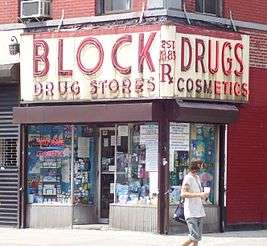Block Drug
Block Drug Company was a pharmaceutical company based in Jersey City, New Jersey, United States, that specialized in dental care products. Its most popular products included Polident denture cleanser, Poli-Grip denture adhesive, Dentu-Creme denture toothpaste, Nytol sleeping pill, Tegrin medicated shampoo for psoriasis, Lava hand soaps (acquired from Procter & Gamble), Beano and Phazyme anti-gas products, Balmex diaper rash ointments, and Sensodyne desensitizing toothpaste.[1]
 | |
| Industry | Pharmaceutical |
|---|---|
| Fate | Acquired |
| Successor | GlaxoSmithKline |
| Founded | 1907 |
| Defunct | 2001 |
| Headquarters | Jersey City, New Jersey, United States |
Key people | Alexander Block, Leonard Block, Michael P. Danziger |
| Products | Polident, Poli-Grip, Dentu-Creme, Nytol, Tegrin, Lava Soap, Beano, Phazyme, Balmex, Sensodyne |
Number of employees | 3,000 |
GlaxoSmithKline purchased the company for $1.24 billion in 2001.[2][3]
History
The company was founded in 1907 by Alexander Block, a Russian immigrant who had a small drugstore on Fulton Street in Brooklyn, New York. He turned the company into a wholesaler in 1915, then became a drug manufacturer in 1925, acquiring a 50 percent interest in Wernet's Dental Manufacturing Company.[1]
Block Drug moved its headquarters to Jersey City, New Jersey in 1938.[4]
Although Alexander Block built the company largely through acquisitions, he developed the Polident brand internally during the 1930s.[5] In 1948, Block Drug rolled out the Ammi-i-Dent tooth powder, and in the early 1950s, the company developed Nytol.[6] After Alexander Block's death in 1953,[5] his son Leonard N. Block (1911–2005)[4] took over, eventually becoming the company's chairman.[5] The last major new product the company introduced was Tegrin, in 1964.[5]
Timeline
- 1971 – The company went public, trading on NASDAQ under the ticker symbol BLOCA and raising $5.2 million in its initial offering.[6] Two years later, another stock sale generated $23 million.[6] Later in the 1970s, Efferdent took over from Polident as the No. 1 brand in its space.[5]
- 1972 – Block named as its president James Block, who was the grandson of Alexander Block and the nephew of Leonard N. Block.[5] In 1988, James became chairman as his uncle, Leonard N. Block became senior chairman.[6] At the same time, Leonard N. Block's son, Thomas, became the company's president.[6][7]
- 1978 – Block Drug entered the feminine hygiene market, with the ultimately unsuccessful Gentle Spring brand.[8]
- 1983 – The company acquired Passaic, New Jersey-based 2000 Flushes toilet bowl cleaner manufacturer Flushco.[6] In 1985, Block Drug acquired the X-14 line of hard surface cleaners from White Laboratories.[6] Block Drug later acquired Gold Bond in 1987.
- 1990s – Sales began to fall as Block Drug's products began to age and face new competition, and the problem was exacerbated by a lack of new products.[6]
- 1990 – Block Drug sold Gold Bond to Martin Himmel Inc..
- 1992 – The company acquired Phazyme from Reed and Carnrick.
- 1995 – Block Drug divested its U.S. Reed and Carnrick Pharmaceuticals Division to Schwarz Pharma KermersUrban and also purchased Reckitt and Colman's Carpet Fresh and Rug Fresh cleaning and deodorizing products.[7]
- Late 1995 – The company acquired the Lava soap brand from Procter & Gamble.[7]
- 1996 – Block Drug purchased the Baby's Own line of baby care products, and then acquired Beano antigas tablets in 1997.[7]
- 1998 – A major restructuring took place but was not successful.[6] As part of that, the company divested Carpet Fresh, Rug Fresh, 2000 Flushes and X-14.[7] Lava was later sold to WD-40 Company the following year.
- 1999 – The company acquired Salisbury, N.C.-based Stanback Co., manufacturer of Stanback headache powder products.[9]
- 2000 – Block Drug hired Goldman Sachs as an adviser to evaluate a potential sale.[10]
- 2001 – At the time of its sale to Glaxo, Block Drug was reported to have $900 million in annual sales, operations in 100 countries and employed 3,000 people.[2]
Secrecy
Although Block Drug was a public company from 1971 until 2001, it operated much like a private, family-run firm, with the Block family holding all voting shares plus 54 percent of the non-voting stock. In addition, the company never held annual meetings or issued proxy statements.[6]
Aftermath
Leonard N. Block died in 2005 at age 93 after suffering for years from Alzheimer's disease.[4] Block's nephew John P. Roberts was the producer of the Woodstock Festival using money from his Block inheritance.
References
- The Gale Group. International Directory of Company Histories, republished at "Block Drug Company, Inc.: Information from Answers.com". Answers Corporation.
- GlaxoSmithKline Completes the Purchase of Block Drug for $1.24 Billion Prnewswire (January 16, 2001)
- Hall, John. "Briefing: Pharmaceuticals; Drug Company" The New York Times (October 15, 2000)
- Saxon, Wolfgang (2005-11-12). "Leonard Block, 93, Chief of Drug Company, Is Dead". The New York Times. Retrieved 2010-04-26.
- "New Chip at the Old Block?". Forbes. May 29, 1978. p. 48.
- Goldblatt, Dan (September 7, 1994). "New Jersey's most private public company". Northern Business. p. 48.
- "History of Block Drug Company, Inc. – FundingUniverse". www.fundinguniverse.com.
- "New Chip at the Old Block?". Chicago Sun-Times. May 29, 1978. p. 48.
- "Stanback to leave Rowan". www.bizjournals.com. Retrieved 2019-05-28.
- Clark, Andrew (October 7, 2000). "SmithKline to swallow Sensodyne: Aquafresh maker lines up Dollars 1.2bn bid for privately owned toothpaste company Block Drug". The Guardian (London). p. 29.